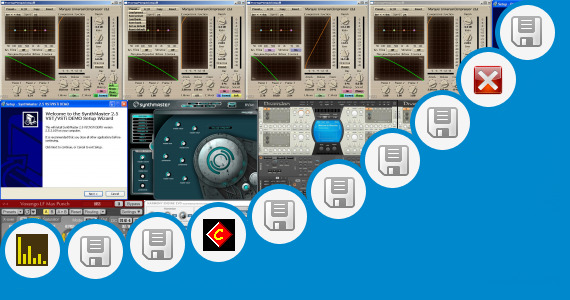
Rob Papen Linplug Albino Vsti V302 Incl Keygen Beat

Rob.papen.predator.vsti.rtas.v1.5.8 Serial Numbers. Convert Rob.papen.predator.vsti.rtas.v1.5.8 trail version to full software. Rob Papen Linplug Albino Vsti V3.3 Serial Numbers. Convert Rob Papen Linplug Albino Vsti V3.3 trail version to full software.
Quote 1992 wavestation eX Lexicon LXP15 Effects Processor Akai S1000 Sampler Korg Wavestation A/D Yamaha MT120 4-track Cassette Recorder C-Lab Notator/Creator v3.1 Mackie 1202 Mixer Roland JV80 & JV30 Synths Roland JD800 Opcode Studio 5 Macintosh MIDI Interface Korg 03R/W Synth Module Korg 01/W Pro + Pro X Roland R70: Human Rhythm Composer Mastertracks Pro 5 Mac Sequencing Software from Passport Yamaha TG100 Akai S1100 Turtle Beach Multisound PC sound card Boss DR550 MKII: Drum Machine Emu Proteus 3 World Boss DS330 Dr. Synth GM/GS Synth Module Ensoniq DP/4 Parallel Effects Processor Passport Master Tracks Pro 4: Sequencer for Windows Yamaha SY85 AWM2 Workstation Akai S01 Sampler Roland JW50 General MIDI Music Workstation Yamaha TG500 64-note polyphonic synth expander Twelve Tone Systems Cakewalk For Windows Sequencer Zoom 9120 Advanced sound environment processor. Quote Super Sequencer 128 from Sonus Corporation is a full featured, professional-quality, MIDI sequencing program for the Commodore 128 computer. This item appears to be New Old Stock. I also have a listing for a MIDI interface by the same company, would make a good combo purchase and I can bundle shipping. Some key features: • Greater note capacity than Commodore 64 • Works with most interface cards • Step entry record • Advanced editing functions • Built-in SYSEX librarian • Selectable tempo • and much more (see pics for more details).
Quote THERE'S NOTHING LIKE getting to know your system. Except, perhaps, getting to know your system all over again. This is one of the things which passed through my mind as I got out the old Commodore 64, which I had put aside months ago following a move to a new neighbourhood. Like many people, I'd used the C64 for sequencing quite a bit over the past couple of years, so when three new programs appeared on my desk, along with the news that they would work with the sequence files I had created with Syntech's Studio 1 sequencer program, a new enthusiasm for the C64 swept over me. Altima studio kryak.
Because the new programs were the MIDI Processor and MIDI Tech, both capable of editing sequence data down to the byte. Also new to me, though not entirely, was the Super Sequencer 64, which bears more than a passing resemblance to the Studio 1, mainly because the same man wrote both programs. The company behind all three packages is Sonus, a Californian software house established by one Don Taylor, formerly of Syntech. It's due partly to Taylor's efforts that the company now has a UK outlet - called, imaginatively enough, Sonus UK - to distribute the programs and look after such things as marketing, development and after-sales service. This puts Sonus in something of an unusual (and perhaps advantageous) position, since most US software companies seem content to let their programs be handled by third-party distributors outside their homeland. Anyway, with new MIDI tools in tow, the Commodore-based home sequencing environment returned to my living room. Super Sequencer 64 ALTHOUGH A LOT of Sonus software is available for both the C64 and C128, I chose to review the 64-based version for a variety of reasons; not the least being the fact that I happen to own an SX64 (the portable version of the 64), the other being that the 64 programs can run on C128s operating in '64 mode'.
For those unfamiliar with the Super Sequencer or the Studio 1, it should be enough to say that the Studio 1 was one of the first sequencer programs for the C64 which really made the computer a worthwhile tool for musicians. Of course, this program did come out a few years ago, but back then, everyone with a MIDI synthesiser was waiting for something - anything, really - to happen. The Studio 1 happened, and though it didn't do as much to further the cause of single-note editing as, say, the Dr T KCS, the Studio 1 was - and the Super Sequencer is - much easier to come to grips with, thus making the sequencing process more appealing to more musicians. Set up much like a drum machine, in that it facilitates the recording of sequences which may be linked into songs, the Super Sequencer is basically a one-screen program. And once you understand how to work your way around that screen, the rest comes pretty naturally. The only things that change from operation to operation are the four options displayed at the bottom of the screen; these comprise names either of specific functions or of other function menus. Navigating the Super Sequencer's functions is a simple matter of using the four 'F' keys in conjunction with the Shift and Control keys on the Commodore's keyboard.